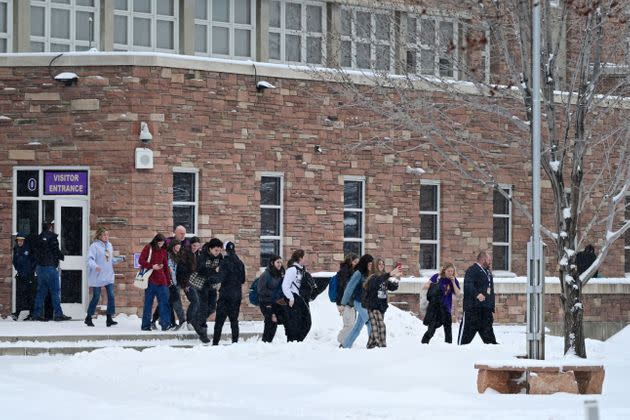More Fake Active Shooter Threats Prompt Real Police Response Around The Country
Colorado schools became the latest to field fake emergency phone calls about active shooter and bomb threats on Wednesday in what has become an alarming trend that strains emergency resources and rattles communities nationwide.
Schools in around a dozen districts across Colorado, including Boulder High School and Aspen Elementary School, were forced to go into lockdown mode, according to the Denver Post. Some of the lockdowns were lifted after just a few minutes, but some lasted hours and led to canceled classes.
As it has been doing in other states, the FBI is assisting local law enforcement agencies with their investigations, but the federal agency has not offered many answers.
Boulder Police Chief Maris Herold could not confirm in a news conference whether all of the recent calls came from the same person, but she said they were made in “a systematic way.”
Herold told reporters she listened to the call about the supposed shooter at Boulder High, and that “in the background, you can actually hear shots being fired.”
Authorities then rushed to the school and worked to clear every room on every floor.
It’s a problem that officials in many states have had to contend with as the threat of real mass shootings remains ever-present in the United States.
“Obviously, this is the scariest kind of call — a 911 call — as you can get, especially as you look across the country and you see how many of these shootings are occurring,” Herold said. “Very scary call.”

Teachers and students are escorted out of Boulder High School.
On Feb. 7, schools in at least eight districts in Michigan received calls about an active threat that turned out to be fake. At least 21 individual public and private schools in Vermont were the targets of hoax calls the day after, prompting dozens of officers to descend on Montpelier High School.
“This is terrorism to invoke fear and chaos in a community,” Vermont Public Safety Commissioner Jennifer Morrison said, local CBS affiliate WCAX reported.
Last week, Massachusetts school districts fielded fake school shooter and bomb threats for three straight days, impacting more than 30 schools.
The list goes on. Schools all over California have also been receiving hoax callsthis month. NPR reporter Odette Yousef counted well over 100 such calls around the country over a three-week span last fall.
Many law enforcement officials refer to the incidents as “swatting,” a term popularized by the online gaming community after malicious viewers learned it was not difficult to convince a local SWAT team to show up at a gamer’s front door during a livestream as a so-called prank.
In some cases, the caller uses an internet phone number to dial emergency services or to call a school directly. A threat against Jackson High School in Jackson, Michigan, came in via “an unknown Google number,” the district’s superintendent said in a statement.
Given the available technology, it can be hard to track down the callers, homeland security expert Juliette Kayyem said last week in an interview with WGBH, a Boston-based public radio station.
An NPR investigation published in October found that it was exceedingly easy to use a service like TextNow to sign up for a new phone number capable of making calls or texts from a web browser. If the number gets blocked, it’s just as easy to make a new one.
Using open records requests, NPR gained access to a report compiled by a Louisiana sheriff’s office last spring. The records showed how just one internet phone number made or received well over 400 calls, with most being outgoing calls to schools or law enforcement in several states.
The IP addresses tied to the number were linked to Ethiopia. But NPR cautioned that this did not mean the caller was physically located in Ethiopia, as there are other ways to make it look like that was the case.
NPR noted that the caller spoke with a “heavy accent,” a phrase that Michigan authorities used to describe the caller who targeted schools there, according to WWMT, a local CBS affiliate.
Colorado authorities have not commented on the provenance of the calls made Wednesday.
In a statement to local news outlet KDVR, the FBI said: “It is important to note that law enforcement will use all available resources to investigate a threat until we determine whether it is real or not. Investigating hoax threats drains law enforcement resources and diverts officers from responding to an actual crisis.”
When schools make students and staff go into lockdown without being able to tell whether a threat is legitimate or not, it raises the question of psychological impact on a generation of kids.
“The traumatic effects of this on kids are just — you can’t even measure it at this stage. Lock down or don’t lock down? Is it real? Is it not real?” Kayyem remarked on WGBH.
Herold declined to offer specifics on how the Boulder High School students were feeling.
She added: “In my wildest imagination, I cannot imagine doing this to people.”
